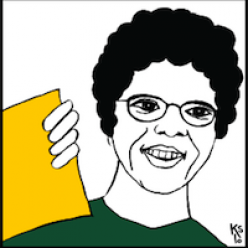OBJECTIVES:
To explore the experiences and narratives of promotoras — i.e., women who do community-based development work — pertaining to their learning before, during, and after their participation at the Women Walking Together/Oral History program and/or the Diploma in Leadership and Community-Based Development Program in Tijuana. These two adult and higher education alternative programs for women in Tijuana, Mexico are now 20th years old and in part were made possible thanks to partnerships with Simon Fraser University of Canada and other local and international development institutions in Mexico, the USA, and Canada.
To evaluate, from the perspective of women learners, outcomes of the Women Walking Together/Oral History program and/or the Diploma in Leadership and Community-Based Development Program in Tijuana.
METHODS:
An outcomes evaluation study was conducted using inductive qualitative methods for collecting and analyzing data. Ethnographic fieldwork was done in Tijuana, Baja California, Mexico (January 2018) including site visits to community-based projects and households, and audio-recorded semi-structured interviews. The participants were women promotoras (promoters of community-based development) aged 18 years or older that participated at the Oral History /Women Walking Together program for promoters, or the Diploma in Leadership and Community-Based Development Program in Tijuana.
RESULTS:
In total, 51 women were interviewed. The greatest areas of learning included personal growth and self-esteem, conflict management, inter-personal communications applied to community needs and resources assessment, oral and written communication, and digital literacy. The participants reported that through the Oral History Project they learned critical digital and technical skills but, more importantly, they learned how to develop and undertake research with vulnerable women. From the Diploma program, interviewees reported extreme satisfaction with the feminist and dialectic pedagogical methods and curriculum developed for them; they reported challenges to meet the learning objectives of the program despite pressures and expectations set by self/family/community. Most interviewees credited the Diplomado and their peers for helping them overcome barriers to learn about their own personal and educational dreams and capabilities. Since graduating, the majority of participants in the educational programs have undertaken continued learning through other free training programs offered in the community. Most participants when entering the Diplomado or Oral History programs did not have their secondary or high school certificates of completion; these women attribute their experience in the Diplomado with opening to them opportunities for post-secondary education and income security.
CONCLUSIONS:
Access to free and alternative adult and higher education programs for women from vulnerable communities in the Tijuana area is as difficult today as it was 20 years ago when the Diplomado for promotoras and the Common Journeys programs were first established. Participants reported a crucial need for educational programs that are accessible from the perspective of low-income and low-literacy women. Lack of reliable public transportation to attend school, the expectation that women be house-bonded to look after their family and children childcare carries a heavy weight in the ability of women to access education and paid job opportunities. While women are ideally positioned to do community-based work and many have done it without the need of a post-secondary certificate, access to a formal and structured alternative post-secondary education program designed for these women provides them with more efficient tools and critical thinking skills that can lead to more egalitarian and sustainable development.
This evaluation project was commissioned by Shaheen Nanji, SFU Director International Programs, and Debbie Bell, former SFU Community Development Programs and SFU Director of the Diplomado in Leadership and Community-Based Development in Tijuana. Funding was provided by Simon Fraser University International (SFUi).
<<<Back to Home page.
